Rocket bicycle sets 207mph speed record
- Published
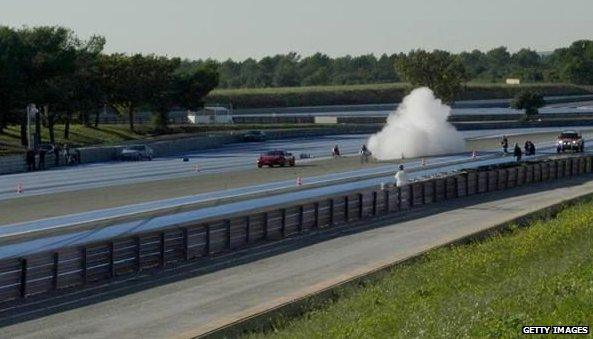
Francois Gissy attached a small rocket to his bicycle, pedalled to the start line, and then fired it up
A cyclist has ridden a rocket-equipped push bicycle into the record books by attaining speeds of 207mph (333km/h) at a racetrack in France.
It took Francois Gissy 4.8 seconds to accelerate to his top speed, external at the Circuit Paul Ricard racetrack, near Marseille.
The Frenchman believes he can achieve 250mph on his next run on the vehicle.
However, he must first raise additional funds.
"It's extremely intense, that's why it's a real feat," he told the BBC following Sunday's ride.
"The bicycle is extremely lightweight, there's no aerodynamic covering and the force of the drag is extreme - maybe 200kg [440lb] of force on my body.
"At the moment [of riding] it's very scary - there's no pleasure like you would get from a motorcycle.
"But when you stop, you think - yes, that was amazing.
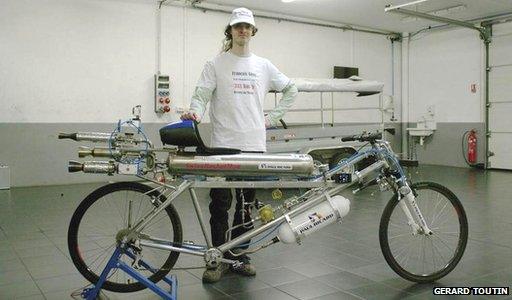
Mr Gissy rides on top of canisters holding the hydrogen peroxide fuel
The rocket-propelled bicycle, named Kamikaze 5, was designed by Mr Gissy's Swiss friend Arnold Neracher, and has been used in a series of ever-faster speed challenges organised by the two men since 2011.
The current model uses concentrated hydrogen peroxide as fuel and silver as a catalyst. This generates heat and water, which is expelled as steam through a rocket nozzle, providing the bike with thrust
This provides a safer alternative to normal rocket engines, which typically burn together two different chemicals.
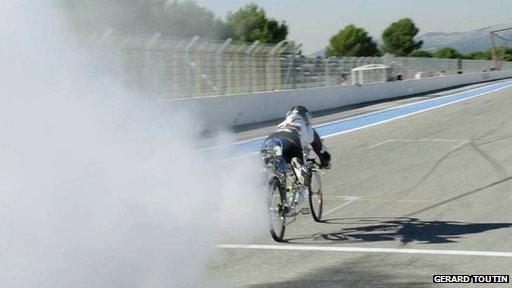
The bicycle expelled steam as it travelled along the racetrack
"On the bicycle it's just on and off, everything or nothing," Mr Gissy added.
"It's a technical challenge, not just speed for speed's sake."
During the ride, Mr Gissy keeps his legs up in the air behind him, putting his body into almost a horizontal position.
Assuming he finds sponsorship, he now hopes to accelerate to 250mph or more in less than two seconds on a revised design, nicknamed the Spine Crusher.
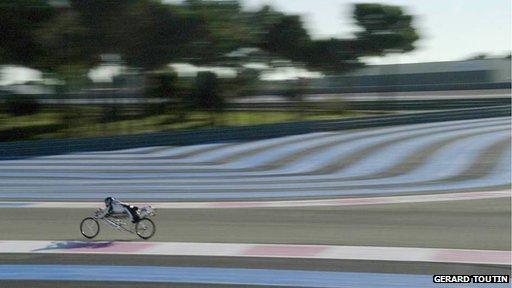
Mr Gissy hit a top speed of 207mph, beating a previous record of 177mph
To do this he may end up mixing two substances together - hydrogen peroxide and either kerosene or vegetable oil.
"It would be more expensive to build, but once it's built the fuel would cost less because it would consume about half the amount of hydrogen peroxide," Mr Gissy said.
"It would be much more spectacular - lots of noise, huge 3m [9.8ft] flames - but it's not necessary to make the performance better."
The 32-year-old former bus driver added that he will need to conduct tests in a wind tunnel before heading back to the track because of the increased G-forces the bike would experience.
"You have to have perfect balance, otherwise the bicycle will be airborne - it can flip over," he said.
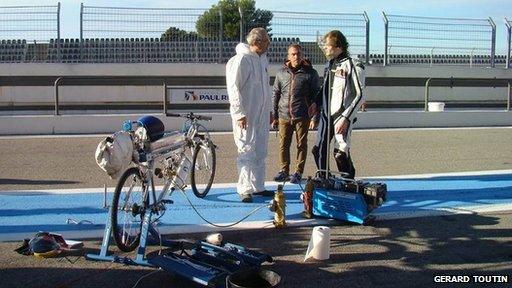
Mr Gissy and his colleague Mr Neracher now hope to top 250mph
Despite the achievement, one expert said the feat would "barely cause a ripple" among the mainstream bicycle community.
"There's few reference points so it's difficult to know how impressive this is or isn't," said Daniel Friebe, a sports writer who covers professional cycling.
"One of the world land speed records on a bike was by Fred Rompelberg, a Dutch guy who did 286 km/h [178mph].
"He was towed and then drafted [in the slipstream] behind a car for about a kilometre in order to qualify. That was an incredible speed, but people were in agreement that he was not in great shape for a bike ride, and I suspect the latest case will be viewed in a similar way."
- Published13 September 2013
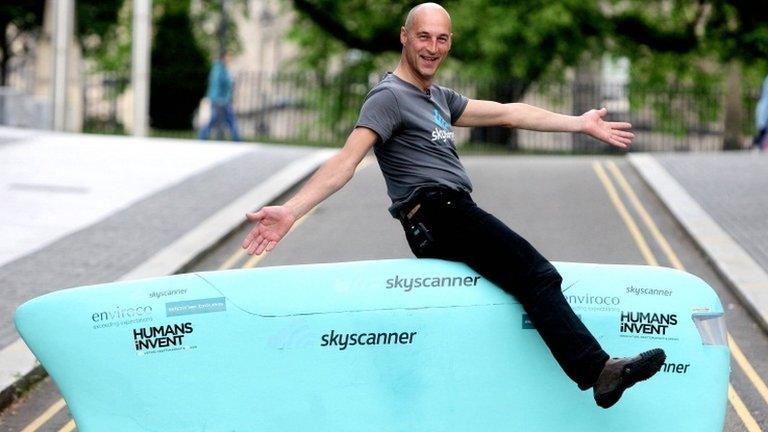
- Published10 September 2013
